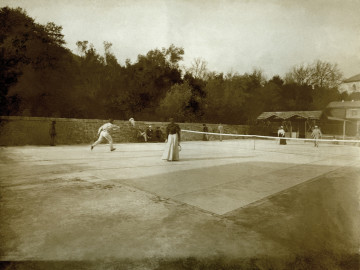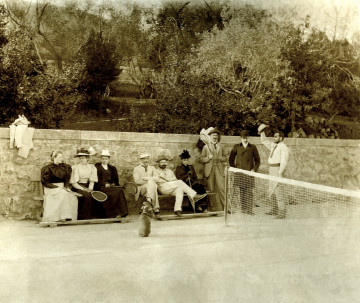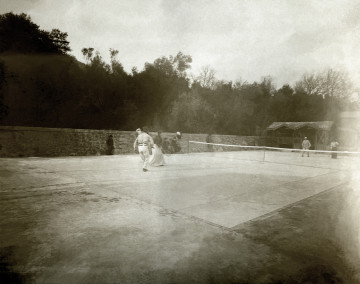
Tennis game
Castle Museum in Łańcut
Part of the collection: European classics of modernity
In 1893, the Munich sculptor Adolf von Hildebrandt published his artistic manifesto entitled Das Problem der Form in der bildenden Kunst [The Problem of Form in the Visual Arts]. The creator of the concept of new classicism found many imitators, and among his most faithful disciples was Bernhard Bleeker. When Bleeker began work on the decoration of the new wing of the Ludwig Maximilian University, Walter Riezler, an admirer of Hildebrandt, who was appointed the director of the City Museum in Szczecin, completed his research on white primed lekhytol there. During the Munich period, Riezler must have met Bernhard Bleeker, who produced a portrait of the theorist at the same time, and his younger brother Hermann. The latter took an identical path since he shared a studio with Bernhard between 1910 and 1911, became Hildebrandt's assistant at the Academy of Fine Arts and then at his private atelier in Florence. Hermann Bleeker’s graduation work (distinguished by the addition of the surname Kullmer) - a bronze of a walking or running man - was immediately purchased by Riezler and decorated the gallery of contemporary art in the Szczecin museum building completed in 1913. The theme of the sculpture itself undoubtedly stems from the reception of Auguste Rodin's work, especially his Kroczący mężczyzna [The Walking Man] (c. 1900). Rodin exhibited frequently at Munich's Crystal Palace, was a member of the local Secession and a corresponding member of the Academy. The statue of an athlete with a Roman profile and massive figure, however, is mainly an emanation of the principles of Hildebrandt's composition: the maximum emphasis on the spatial suggestiveness of individual members. Each anatomical element was developed to create a variety of precise contours and a clear view, especially from a long distance (the so-called Fernbild). Although Bleeker-Kullmer produced many more sculptural works, portraits, gravestone and war memorials, coin and medal designs, Biegacz [The Runner] remained his most important work.
Szymon Piotr Kubiak
Author / creator
Dimensions
cały obiekt: height: 170 cm, width: 60 cm
Object type
sculpture
Creation time / dating
Creation / finding place
Identification number
Location / status

Castle Museum in Łańcut

Castle Museum in Łańcut

XIX century
Castle Museum in Łańcut
DISCOVER this TOPIC
Museum of King Jan III's Palace at Wilanów
DISCOVER this PATH
Educational path